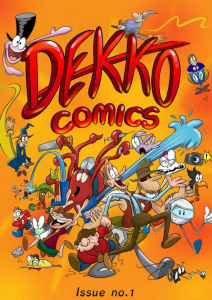
As a BBC news anchor Sally Magnusson’s career revolves around words and reading is second nature. But the journalist has told of the anguish of her son’s dyslexia that left her struggling to find a way to help him tackle basic textbooks.

Rossie Stone, 26, was diagnosed when he was 11 and was taunted by his classmates. It was only when he used his love of comics to transform his revision notes that he was finally able to shake the stigma that blighted his school years.
Rossie, a sufferer of dyslexia, has created a comic book to help children overcome their own reading problems. Now he is using his creative flair to help other children after starting his own educational comic book business, who have already been lauded by local authorities and teachers.
And mum Sally believes it could revolutionise the school syllabus. She said: “I found it progressively more heartbreaking watching Rossie because I saw how hard he was working. It was frustrating for us both. “Probably a lot of the time I wasn’t that helpful. I’d say, ‘Why can’t you remember that, you just read it two minutes ago?’ “When I see what he has done I’m so immensely proud.”
Rossie excelled at art and drama but when it came to maths, English and science, he was trailing behind classmates at Glasgow High School. He’s not alone. It’s estimated that up to one in every 20 people in the UK has some degree of dyslexia. He said: “I blamed myself and wondered if I was the dumb kid and if everyone found it so hard. “I had a really bad exam year in Standard Grade and the grades just didn’t reflect the effort I put into them. I brought myself to tears.”
Sally looked for the best possible help for Rossie. He got extra time and support and was given one-to-one sessions but he said it only made him feel worse. Rossie said: “I hated being singled out. It just emphasised the feeling of being the stupid kid. “My mum is the most wonderful mum in the world and tried so hard to help. She always liked learning in the conventional way. She poured the time and effort into me.”
Rossie believed his C and D grades were fails but he was desperate to be able to go to university. So he picked subjects he loved – art, drama and modern studies – as his Highers. He said: “I thought to myself if I’m going to fail, I might as well enjoy it. I didn’t want to do all that study again just for a D.
“I always found it easier to read in comic or graphic novel form. And I thought if I’m at least enjoying the process of learning, that’s something.” Rossie began to turn his notes into comic book form – chopping up revision into smaller text boxes with images alongside. He said: “It was a revelation. It was like recalling an episode of The Simpsons and the information was staying in.” Sally said she was astonished at how novel his approach was.Rossie went on to get his first A in an academic subject and his results earned him a place at Duncan of Jordanstone College of Art and Design in Dundee.
He founded Dekko comics three years ago and they have already caught the attention of national and international teachers, academics and parents. The motto of the company is to turn education into fun and help all children but especially those who struggle with a lot of text. He said: “Imagine if I had discovered all of this much earlier? I could have looked forward to school. I want to share this technique because I believe it can help other children.” Rossie has been working full-time on the comics since 2015 and there are now four staff members working to produce one issue a month of Dekko comics. He said: “It has come full circle. I studied in Dundee, the home of The Beano, had a job for a time teaching and now those things have all come together in Dekko comics.”

Two of Scotland’s local authorities are already using the comics, which feature maths and English in every issue. In total, about 30 schools are using them, as well as parents all around the country. Rossie has had orders from the US and the comics will also be translated into other languages. He said: “We are able to make things like times tables accessible. Instead of just having the figure seven, we will have it in the shape of an alligator. “We have recurring characters and all the lessons are in the form of a story. The feedback has been fantastic.”
Rossie has already met with MPs and is hoping for a meeting with Education Secretary John Swinney. Eventually he wants an app where users can tailor their learning experience and apply practical elements like colour filters which can help some dyslexics.
Sally said: “Drawing comic strips was a revelation. He found a way of learning that excited and energised him and seemed to stimulate his memory in completely new ways. His grades improved massively. I’m tremendously proud.”
